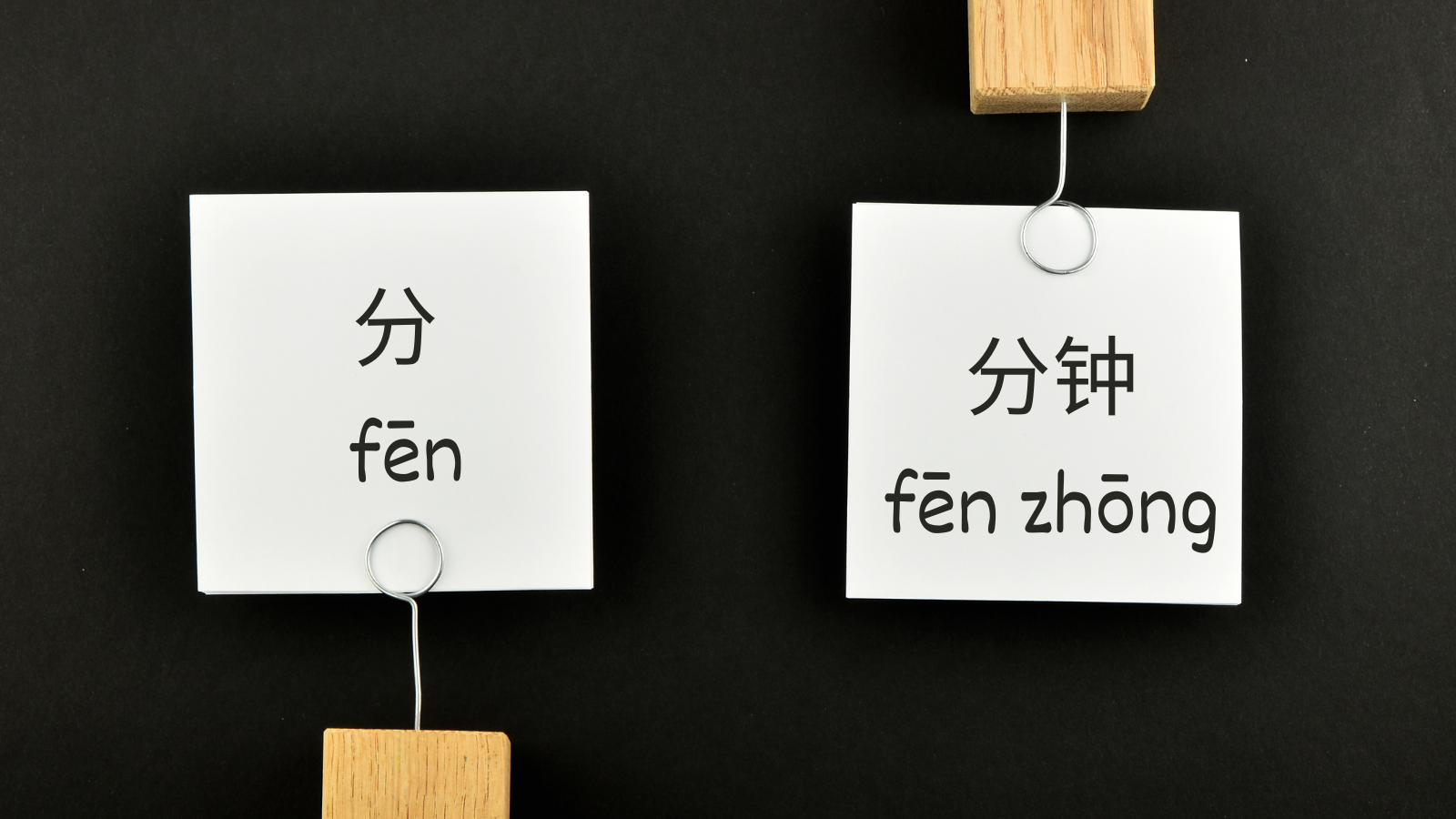分 (fēn) and 分钟 (fēnzhōng): The Difference in Meaning and Usage in Chinese

Introduction
Welcome to our blog post on the nuances between the Chinese words for "minute" – 分 (fēn) and 分钟 (fēnzhōng). Although they are both translated as "minute," they have different meanings and usages.
Our post will examine these differences, explore their unique connotations, and offer exercises to help you master these concepts. So, let's dive in and explore the fascinating variations between these two words!
分 (fēn) and 分钟 (fēnzhōng) - Similarities and Differences
"Minute" can be translated to both 分 (fēn) and 分钟 (fēnzhōng) in Chinese. However, what distinguishes these two terms exactly? Let's learn more about their unique meanings.
- 分 (fēn) is typically used when indicating a specific minute within an hour.
- 分钟 (fēnzhōng) is typically used when expressing durations or lengths of time in minutes.
Simply put, 分 (fēn) refers to a specific time, while 分钟 (fēnzhōng) refers to a period of time.
Examples
- 现在是十一点十分。(Xiànzài shì shíyī diǎn shí fēn.) - It is ten past eleven.
- 我每天早上锻炼十分钟。(Wǒ měitiān zǎoshang duànliàn shí fēnzhōng.) - I exercise for ten minutes every morning.
十一点十分 (shíyī diǎn shí fēn) is a specific time, while 十分钟 (shí fēnzhōng) is a period of time.
- 我明天早上得八点五分起床。(Wǒ míngtiān zǎoshang děi bā diǎn wǔ fēn qǐchuáng.) - I have to get up at five past eight tomorrow morning.
- 我每天花五分钟做冥想。(Wǒ měitiān huā wǔ fēnzhōng zuò míngxiǎng.) - I spend five minutes meditating every day.
八点五分 (bā diǎn wǔ fēn) is a specific time, while 五分钟 (wǔ fēnzhōng) is a period of time.
- 超市每天晚上十点五分关门。(Chāoshì měitiān wǎnshang shí diǎn wǔ fēn guānmén.) - The supermarket closes at ten five every night.
- 我每天坐公交车上班需要十五分钟。(Wǒ měitiān zuò gōngjiāochē shàngbān xūyào shíwǔ fēnzhōng.) - It takes me fifteen minutes to commute to work by bus every day.
十点五分 (shí diǎn wǔ fēn) is a specific time, while 十五分钟 (shíwǔ fēnzhōng) is a period of time.
In this post, we have explored the fundamental differences between 分 (fēn) and 分钟 (fēnzhōng), seen their varied usages, and discussed how each indicates a different context.
Practice makes perfect. Here are some exercises to help you improve your skills and confidence. So don't waste any more time! Continue practicing by completing the exercises and checking your answers.
Before long, you'll become a Chinese professional—that is, after all, our ultimate goal!
Exercises
Please complete the sentences with 分 (fēn) or 分钟 (fēnzhōng):
1.
我们还有十 __ 的休息时间。
Wǒmen hái yǒu shí __ de xiūxi shíjiān.
We still have ten minutes of break time.
2.
明天早上九点十 __ 我们要开会。
Míngtiān zǎoshang jiǔ diǎn shí __ wǒmen yào kāihuì.
We have a meeting at nine ten tomorrow morning.
3.
你能等我五 __ 吗?
Nǐ néng děng wǒ wǔ __ ma?
Can you wait for me for five minutes?
4.
飞机十点五 __ 起飞。
Fēijī shí diǎn wǔ __ qǐfēi.
The plane will take off at ten five.
5.
我们每天早上要花二十 __ 做早餐。
Wǒmen měitiān zǎoshang yào huā èrshí __ zuò zǎocān.
We spend twenty minutes making breakfast every morning.
Answers
1.
我们还有十分钟的休息时间。
Wǒmen hái yǒu shí fēnzhōng de xiūxi shíjiān.
We still have ten minutes of break time.
2.
明天早上九点十分我们要开会。
Míngtiān zǎoshang jiǔ diǎn shífēn wǒmen yào kāihuì.
We have a meeting at nine ten tomorrow morning.
3.
你能等我五分钟吗?
Nǐ néng děng wǒ wǔ fēnzhōng ma?
Can you wait for me for five minutes?
4.
飞机十点五分起飞。
Fēijī shí diǎn wǔ fēn qǐfēi.
The plane will take off at ten five.
5.
我们每天早上要花二十分钟做早餐。
Wǒmen měitiān zǎoshang yào huā èrshí fēnzhōng zuò zǎocān.
We spend twenty minutes making breakfast every morning.